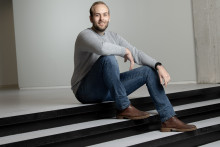‘Can you see if I’m lying?’ That is usually the first question people ask Peter Slijkhuis when they hear about his PhD research. The UT scientist studies deception detection. In other words, he wants to help people recognize if somebody is lying.
Peter Slijkhuis
PhD research topic: The Other Side of Deception: A Receiver-Centric Approach to Understanding Deception Detection
Work: Coordinator Education BMS Lab & PhD candidate at the Psychology of Conflict, Risk and Safety department, Faculty of Behavioural, Management and Social Sciences (BMS) at the University of Twente
Education: Master of Science in Psychology, University of Twente
Originally from: Zwolle, The Netherlands
‘People are very bad at detecting deception’, says Slijkhuis. ‘Guessing if someone is lying is like a coin toss. It’s always a fifty-fifty chance.’ To this day, it remains unclear why people are so terrible at spotting lies, adds the PhD candidate. ‘In general, people simply want to believe that others are telling the truth.’
Until now, most research has focused on the person who is deceiving – on the liar. Scientists have studied the various verbal and nonverbal cues a liar uses. However, deception is a social interaction, stresses Slijkhuis.
‘There are always two people in the conversation – the sender and the receiver’, he says. ‘In my research, I focus on the observer or the receiver of deception. I want to know what happens on the other side and determine if and how you, as the receiver, can detect deception.’
Using technology
Peter Slijkhuis is a cognitive psychologist by training and currently works as Coordinator of Education at the UT’s BMS Lab four days a week, while focusing on his PhD one day a week. A good combination, as he is able to use the various technologies available at the BMS Lab for his doctoral research.
So far, he has used eye-tracking and automated facial expressions analysis, which helps detect quick microexpressions like a lip curl or a raised eyebrow. He also plans to use virtual reality (VR) for a field study with the police.
‘I really like the idea of linking new technology to old psychological concepts such as deception’, says Slijkhuis. ‘It has fascinated me that deception is something that is everywhere. It’s a topic relevant to every conversation and interaction. We are always wondering: can I trust this person and what they are saying to me?’
Preconceptions
It is a question as old as time, adds the scientist. ‘As long as people have existed, they have been trying to determine if someone is deceiving them or not. I want to find out what works against them in this effort.’ Because, as he repeats, people ‘are simply very bad at detecting lies’, especially if they are not trained to do so. ‘And even with training, it is highly debatable if people can detect deception.’
It seems that people have a lot of preconceptions about what a liar does. For instance, many people believe that a liar will never look you in the eye. These ideas, however, don’t help us in detecting deception, explains Slijkhuis. On the contrary.
‘So far, the research has led to more questions than answers’, laughs Slijkhuis. ‘What we see, however, is that preconceived notions don’t match the behavior of the receiver. For example, if they believe that a liar always looks away, you’d expect the receiver to focus on the sender’s eyes during the conversation, but that doesn’t happen.’
Help for law enforcement
Which is why it’s important to remember that deception is always a conversation, stresses the doctoral candidate. ‘There are always two parties, and we should not only focus on the deceiver. There is also the person who receives a lie and needs to process it. To detect a lie, they first need to ask themselves what they believe about lies and lying.’
Slijkhuis aims to finish his PhD thesis next year and believes that his work can be helpful for law enforcement and security, such as border patrol. ‘The research is mainly aimed at professionals like police officers who do interviews. It could help inform their training so they know what they should focus on during the conversation. We could use the findings to develop more informed education for those who need it.’
Ideally, Peter Slijkhuis would love to offer the ultimate advice on how to become better in detecting deception. ‘But this is a question we have been trying to answer for a really long time’, he adds. ‘The oldest papers focused on this topic date back at least to 1890’s, and so I don’t think I’ll have the definitive answer by the end of my PhD. What I try to do, however, is bring a fresh perspective to a very old field.’








